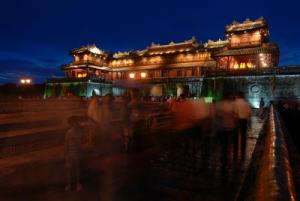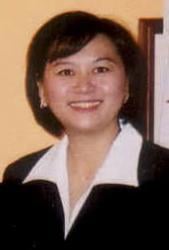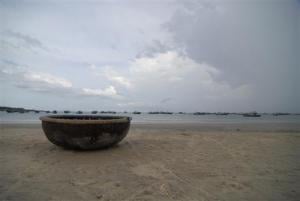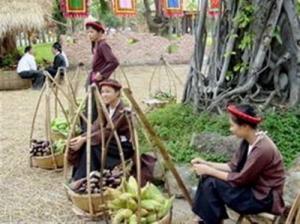Lạc Long Quân and Âu Cơ - The Legend of Ancient Vietnam

Thousands of years ago, during the reign of King Kinh Dương Vương, the Xích Quỷ kingdom was an unknown stretch of a vast land on the far East, leaning its back on a range of high mountains while looking out facing the oceans from a long shoreline. He married princess Long Nữ, the daughter of Động Đình Vương - sovereign of the Động Đình Lake. They were then blessed with one child, a boy whom they called Sung Lam, popularly known in the kingdom as Lạc Long Quân, the "Dragon Lord of Lạc”. Because of Long Nữ’s origin, their son was believed to be a descendant from the line of the Dragons. And indeed, Lạc Long Quân had extraordinary strength and supreme intelligence. But his succession from his mother’s underwater world developed in him a strong fascination for the ocean, and the young man is often seen along the shorelines enjoying the waves and exploring the many sea creatures in sight.
Soon, he succeeded his father’s throne and governed the Lac-Viet tribe. Meanwhile, another kingdom rules the highlands in the north. Their king, Đế Lai, has a beautiful daughter named Âu Cơ. Wanting to unite his northern tribe with Lạc Long Quân’s kingdom; he agreed to give his daughter’s hand for marriage with the young man. And a lavish feast was prepared as princess Âu Cơ was wed with Lạc Long Quân. The two kingdoms then celebrated their unity.
Time went by, Âu Cơ gave birth to a pouch filled with one hundred eggs, which soon hatched into one hundred beautiful children. The children grew up strong and smart like their father, and as kind-hearted and skilful like their mother. They were taught well how to cultivate their lands and live nobly. But soon after, the couple started to grow unhappy. Lạc Long Quân always finds his heart longing for the coasts while Âu Cơ constantly yearns for the highlands.
The couple decided to divide their children, of whom fifty will live with Lạc Long Quân along the coasts. Âu Cơ will lead the other fifty to dwell with her in the highlands. However, they made a promise that despite the distance and separation, they must look after each other and always be there to lend a hand should one be in need.
So, Lạc Long Quân took fifty children to the coast and divided the areas for them to govern. He taught them the skills of fishing and the art of tattoos to scare off sea creatures as they dive and hunt for food. He also trained them to plant and harvest rice, as well as how to cook them in bamboo tubes. Âu Cơ, who took fifty children to the highlands, also divided her areas for them to govern. They were taught to live in the jungles and mountains, breed animals and cultivate the soil to grow fruit trees for food. They learned to build houses raised on bamboo stilts to keep themselves safe from wild animals.
The children of Lạc Long Quân and Âu Cơ are believed to be the ancestors of Vietnam. Today, Vietnamese people call themselves “the children of the Dragon and the Fairy” referring to Lạc Long Quân’s lineage from the world of the Dragons and Âu Cơ’s Fairy Clan from the highlands. Therefore, whichever part of the country one hails from, he belongs to one origin. Just as Lạc Long Quân and Âu Cơ promised to each other, all Vietnamese should love, honor and protect one another. This legend, then, has become the pride and bond of unity for all Vietnamese.
According to many authors, also from Wikipedia: “This legendary story is very important to many Vietnamese people for numerous reasons. Some interpret the story to imply a strong national unity and cultural tolerance. Other women and historians interpret the story to mean that matriarchal societies did exist and are equal to patriarchal societies. Vietnamese women view her as a heroine and as a symbol to fight for their nation and their rights.”









